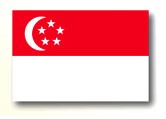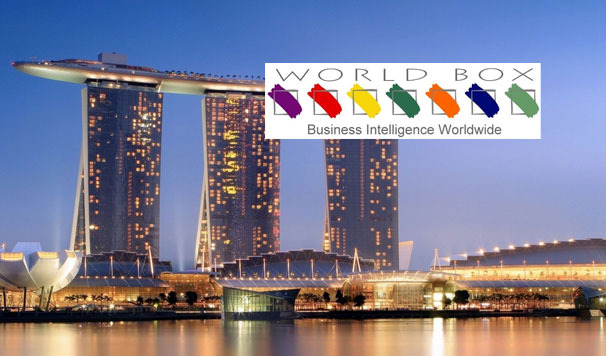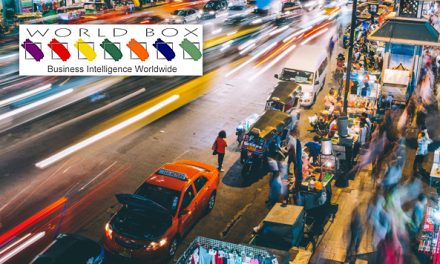Worldbox Country Risk Climate October 2023
SINGAPORE
Summary
| Overall Risk Score 26 (Stable)
Political risk: Stable 9/10 Economic risk: Stable 8/10 Commercial risk: Stable 9/10 The risk assessment of a country is made up of 3 components, being Political, Economic and Commercial. Each component is scored out of 10 with 1 being the highest risk and 10 the lowest. |
ESG Risk: 4/10 (Stable)*
*Environmental, social and governance (ESG) issues are becoming increasingly important to companies, investors and consumers in Southeast Asia. That is why we are now preparing a separate ESG score and section with our quarterly country risk reports. We explain how each country rates, looking at the E, S and G individually, and outline recent developments. |
Political Risk – Stable at 9
Singapore is one Southeast Asia’s most stable countries and one of its richest, with a per capita higher than many advanced Western economies, including the former colonial power, the United Kingdom. The People’s Action Party (PAP) has ruled the country since it split from Malaysia in 1965. Much of the credit for the country’s stability and wealth lies with its first ruler Lee Kuan Yew.
At a time when many newly-independent countries adopted socialist policies, Lee Kuan Yew remained staunchly pro-Western and capitalist. He also prioritised good governance and sought to attract foreign investment to turn Singapore into a manufacturing base with the government investing heavily in infrastructure. Those principles continue to guide Singapore today.
In April 2022 Prime Minister Lee Hsien Loong, the eldest son of Lee Kuan Yew, announced that Finance Minister Lawrence Wong was in pole position to take over the premiership when Lee steps down. Lee announced that Wong will lead the PAP’s “fourth generation” or “4G” team, effectively making the 49-year-old the heir apparent to assume the top job whenever Lee, 70, calls an end to his career. There has been no decision on whether DPM Wong will take over from PM Lee before the next general election, which is due by November 2025 at the earliest.
Wong’s performance as co-chair of the city-state’s COVID-19 task force, along with his relatable image, impressed as the PAP seeks to attract a younger set of voters.
Meanwhile, the establishment of an official “Leader of the Opposition,” a newly instituted role in Singapore, is likely to strengthen checks and balances and lead to a more consultative form of governance that potentially improves accountability. The next general election must be called by 2025.
Economic Risk – Stable at 8
Singapore has the highest possible sovereign credit ratings from Moody’s, Fitch and S&P. Singapore’s large fiscal and external buffers are often better than those of other highly-rated countries. Robust institutions and governance alongside effective policy implementation supports fiscal strength and broad financial stability, and provides plenty of scope to counter cyclical downturns and any long-term structural challenges.
Singapore has a very strong external sector. The current account surplus rose to 19.3%of GDP in 2022, led by a strong goods and services balance. The main drivers of Singapore’s external position have been its financial centre status and household saving related to rapid ageing. Over the medium term, higher public investment in climate resilient infrastructures, ageing-related outlays, and the push towards digitalization are expected to help reduce the overall external imbalance, says the IMF.
The IMF argues that Singapore remains an attractive destination for foreign investment including in semiconductor sector as well as other advanced manufacturing activities, and the authorities’ successful management of the COVID pandemic has entrenched investors’ confidence. Singapore’s knowledge-based economy and high-skilled human capital provide further support.
Commercial Risk – Stable at 9
Singapore consistently ranks as one of the best economies in the world in which to operate. It ranks second out of a possible 190 economies on the World Bank’s ease of doing business scorecard, for example, only behind New Zealand. The republic excels in all areas of doing business, particularly enforcing contracts, protecting minority investors, starting a business, dealing with construction permits and paying taxes. The Singaporean government places a strong emphasis on implementing policies to enhance the business environment and encourage investment.
The country ranks in first place in terms of economic freedom, according to the Heritage Foundation. Although certain civil liberties remain restricted, the PAP has championed economic liberalisation and international trade.
It is also one of the least corrupt societies in the world, ranking fifth in Transparency International’s (TI) 2022 Corruption Perceptions Index. Singapore is again the only Asian country ranked in the top 10. Singapore has tackled corruption decisively and garnered international recognition for its incorruptibility and clean public sector, according to TI.
Singapore benefits from excellent infrastructure, reflecting high levels of investment supported by years of political stability and economic prosperity. The country hosts superb transport links, for example, and its nationwide fibre network provides its citizens with among the fastest home internet speeds in the world.
October Bulletin
Political Risk – Stable at 9
Unprecedented scandals rocked the political establishment in July. The arrest of Transport Minister S Iswaran, marked the first arrest of a minister in four decades. The arrests followed allegations that two other senior ministers had rented colonial-era bungalows in a high-end neighbourhood at below-market rates. Both were cleared of any wrong doing.
However, the episode sparked a heated debate on inequality in Singapore and comes at a time when many people particularly in the younger age brackets feel left behind by Singapore’s economic miracle. Surging rents, with rises of as much as 70%, in particular are becoming a key political issue. Young singles are largely shut out of the subsidised housing programme and are starting to question the government’s resolve to tackle the problem, according to a recent article in the Business Times.
The newspaper added that solving the housing problem is crucial for PAP as the party navigates succession. Prime Minister Lee Hsien Loong is preparing to hand power to the next generation of party leaders. Lee has said that policies must reflect the younger generation’s “significantly different life aspirations and priorities”.
These concerns explain the government’s decision in April to double the additional buyer’s stamp duty to 60% for foreigners buying homes in Singapore– the highest levy among major global cities – while taking other steps such as releasing more land for construction to boost new supply. One analyst has even suggested that the decision to hike stamp duty by so much could signify that PAP is preparing for an election earlier than in 2025.
Deputy Prime Minister Lawrence Wong, all but guaranteed to become the country’s fourth prime minister, has also acknowledged that many Singaporeans feel “anxiety” about being forced to compete with foreigners for jobs. He has vowed to put Singaporeans “at the centre of everything we do”. Balancing the resentment felt by many Singaporeans at the influx of foreign workers and the needs of the economy for highly-skilled workers is likely to prove one of his most challenging tasks.
The proportion of overseas workers on temporary visas has risen dramatically over the past half-century, from 3.2% in 1970 to 33% in 2020. Most are low-paid manual or domestic workers. But much of the resentment is directed at highly paid professionals, many of whom work in the key finance sector. Wong has already vowed to introduce a more progressive tax system, and plans to raise taxes on the richest earners.
The other main challenges include balancing Singapore’s close relations with both China and the US, a difficult task given both powers are battling for influence in the region and given the escalating tensions over Taiwan.
Economic Risk – Stable at 8
The economy grew by 0.5% on a year-on-year basis in the second quarter of 2023, extending the 0.4 per cent growth in the previous quarter. The economy grew by 3.6% overall in 2022. In August, officials lowered the economic growth forecast for this year to the range 0.5% to 1.5%, down from the 0.5% to 2.5% range expected earlier, amid a weak global economy and sluggish demand among key trade partners like China. Singapore’s external demand outlook “remains weak” for the rest of the year, the Ministry of Trade and Industry said.
The trade-oriented economy is a bellwether for global growth. Second quarter data highlighted weakness in the manufacturing sector outweighing the more resilient services sector, which has benefited from the economic reopening after the COVID-19 pandemic.
Consumer prices rose at a slower pace for a fourth straight month in August, while core inflation, which excludes private transport and accommodation costs to better reflect the expenses of Singapore households, dropped to 3.4% year on year in August, from 3.8% in July. Core inflation is expected to moderate further over the next few months as imported costs stay low compared with year-ago levels and the current tightness in the domestic labour market eases, according to the central bank.
Falling inflation and weak economic growth suggest the Monetary Authority of Singapore (MAS) is likely to loosen its monetary policy by early next year. Singapore manages monetary policy through exchange rate settings and not interest rates.
Commercial Risk – Stable at 9
Singapore remains one of the best countries in the world to conduct business.
In its August 2023 Article IV report on Singapore, the IMF said Singapore’s banking system remained sound, supported by strong buffers, while systemic risks were contained. For Singapore’s largest domestic banks, total common equity Tier 1 (CET1) capital ratio stood at 14.8 percent on average in 2023 Q1, substantially above the regulatory minimum.
The IMF added that the corporate sector’s debt-to-GDP fell from 156% in the second quarter of 2021 to about 130% at the end of 2022. Corporate earnings, profitability and debt servicing capacity have been improving, but more slowly for the hotels & restaurants and construction sectors. These sectors are however expected to make a faster recovery with further increases in visitor arrivals and a strong pipeline of projects, according to the IMF.
Environmental, Social and Governance (ESG) – Stable at 8
The United Nations’ Sustainable Development Goals (SDGs) are recognized as a beneficial framework for responsible investment. The Sustainable Development Report from Cambridge University Press assesses the progress of all 193 UN Member States on the SDGs. It provides a useful means of ranking Southeast Asian countries on their ESG progress.
Singapore is ranked 64 out of 166 in the 2022 report with a score of 71.8.
Singapore has the highest score in the ASEAN region, a reflection of the country’s advanced economy, the rule of law and the increasing attention paid to ESG issues by the authorities.
Environment – Singapore is a liveable and sustainable city, with clean air and a generally healthy environment, a robust and diversified supply of water, green spaces and a highly efficient public transport network. It is ranked as the fourth most sustainable city in Asia, according to the 2022 Sustainable Cities Index.
Social – Singapore would be rated higher but for concerns around social issues such as workers’ rights, and political freedom in areas such as expression, assembly, and association. Independent news sites face challenges when operating in the country.
Governance – Another area where Singapore scores highly. The country’s success as a global commercial and financial hub is based on its willingness to embrace international standards, especially in corporate law and capital markets regulation. The authorities have updated their corporate governance code several times over the past 20 years and are moving from a voluntary ‘comply-or-explain’ approach to a partially mandatory one.
October Bulletin
Environmental, Social and Governance (ESG) – Stable at 8
As part of its plans to become a global leader in green finance and sustainable fintech, the government has launched an ESG Impact Hub. It seeks to promote collaboration on ESG finance by facilitating engagement between fintech companies, financial institutions, investors, and other ESG stakeholders.
Overseen by the Monetary Authority of Singapore (MAS), the hub aims to:
- Encourage the growth of technology solutions to address the ESG needs of corporates and financial institutions, notably in terms of accurate measurement, reporting, and verification of climate and sustainability data.
- Anchoring ESG enablers: MAS will engage with key partners to organize ESG initiatives on the hub, such as ESG FinTech accelerator programs, training, and capacity-building workshops, and thought leadership events.
- Supporting ESG stakeholders: MAS will engage with members of the hub to encourage further initiatives, focusing on the eight sectors identified by Singapore’s Green Finance Industry Taskforce (GFIT).
Latest economic data

f – forecasts
1 Three-month S$SIBOR rate
* Forecasts by Worldbox Intelligence
** Trading Economics
*** These figures provide a misleading picture of Singapore’s creditworthiness. They only show gross national debt. When Singapore’s assets are taken into account, the country has a net debt-to-GDP ratio of 0%.
Source: Singapore Government, Monetary Authority of Singapore
Useful Links
https://www.transparency.org/en/cpi/2021
https://www.imf.org/en/Countries/SGP
https://www.straitstimes.com/global
About Worldbox Business Intelligence
Worldbox Business Intelligence, headquartered in Switzerland, is a Global API data solution provider of business intelligence and used in data analytics.
With the Global API solution Worldbox Business Intelligence enables clients and partners also a frictionless real time onboarding, KYC and compliance verification while rapid global investigations are provided, if needed.
Worldbox Business Intelligence provides global data in a standardised structure to more than 200 Million companies worldwide. The global network of subsidiaries, branches and desks allows to precisely and efficiently collect data and target key territories for clients and partners.”
“Worldbox Business Intelligence – Bringing Swiss Precision To Data”
Copyright (C) 2023 Worldbox Business Intelligence. All rights reserved.
Our mailing address is:
Worldbox Business Intelligence
Breitackerstrasse 1
Zollikon
Zurich 8702
Switzerland





























